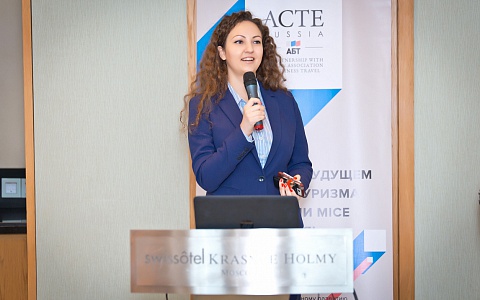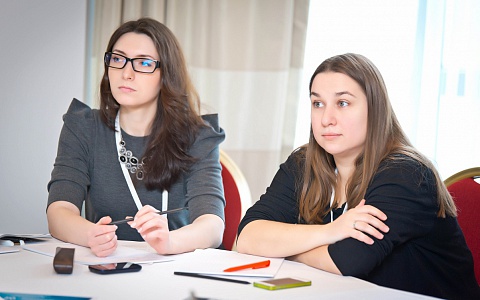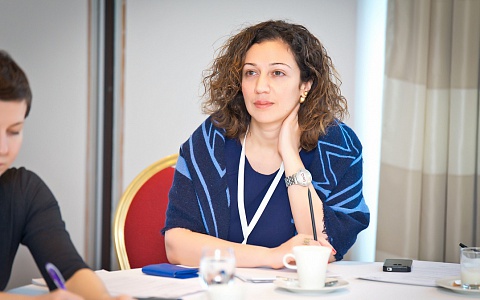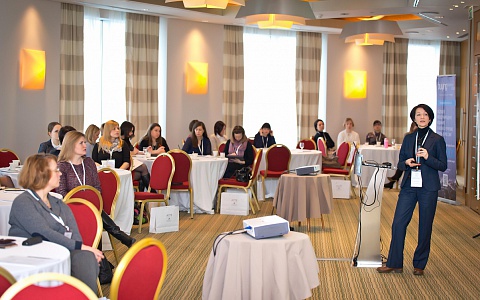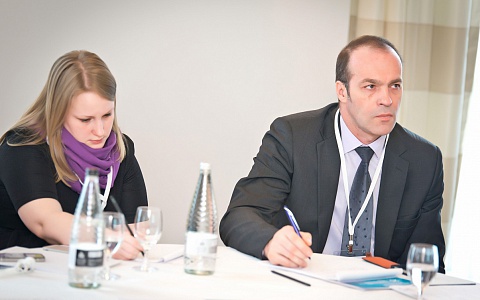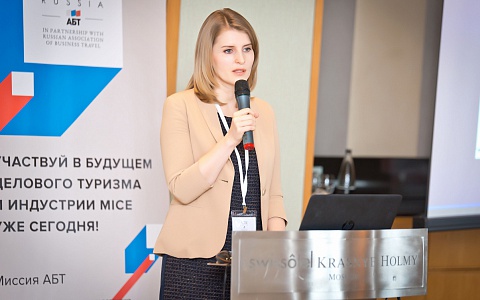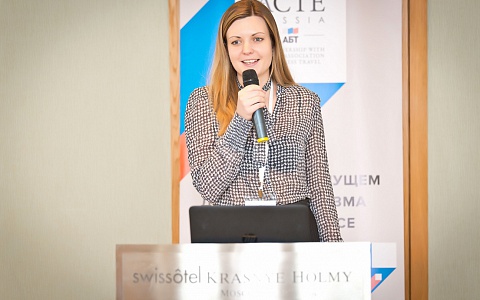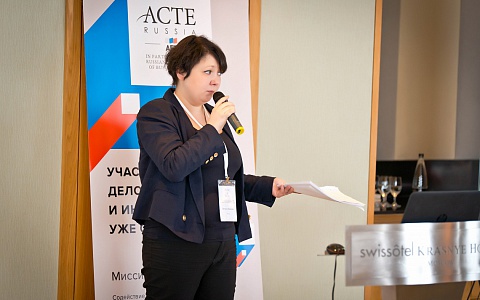A personal search engine, or how technologies change the business trip arrangement process
ABT-ACTE Russia educational session «Online tools of efficient business trip arrangement and management» was held in the Davos hall of Swissotel Krasnye Holmy on March 2. Experts and participants of the session discussed their expectations of corporate online products, their functionality and the process of their introduction. They also learned about the ways to save more than half a million without any effort and to make the life of assistants and accountants easier.
Participants of the event were heads of business travel and purchase departments, administrative directors, travel and event managers of such companies as Johnson & Johnson, PwC, Philip Morris, BNS Group, Merz Pharma, NetCracker, MTS, Media-Markt-Saturn, Severstal, NovaMedica and others. Partners of the session were business travel agencies UTS Group and Zelenski Corporate Travel Solutions and Travelport, a technological provider. Corporate manager of Swissotel Krasnye Holmy Marina Davydova greeted session participants.
Vera Chelenk, Head of administrative department of corporate investment bank BNP Paribas told the participants what online was as understood by corporate buyers and shared her expectations of the product. The company was right in the process of introduction of a Self Booking Tool. According to Ms Chelenk, there are about 170 employees in BNP Paribas, but they travel on business frequently. The most considerable cost item is international and domestic air travel that accounts for 58% of the whole amount of travel costs. The next cost item is hotels — accommodation costs amount to 35% of the travel budget of the company. At the same time agent fees account for a negligible 1-2%, that is why when the Self Booking Tool was introduced, a tool that helps automate the booking process, there was no aim to save on TMC transactions. The reasons that forced the company to use online solutions were completely different.
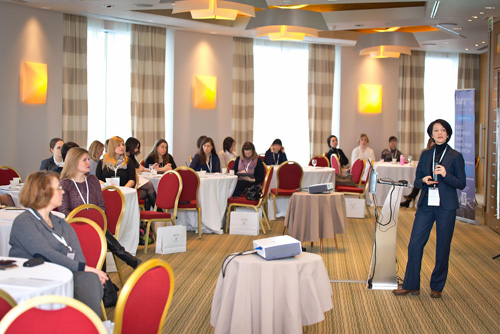
As the speaker noted, a lot of employees were involved in business trip arrangement process in BNP Paribas, as well as in many other companies: travellers, assistants, agency staff, HR and accountants, managers. The main burden is borne by assistants who spend about 25% of their working time on business trip arrangement, and accountants, who spend about 32% of their working time on advance reports. Introduction of an STB, according to Ms Chelenk, is the first step to speed up, simplify and make the process of business trip arrangement more efficient. In the long run, introduction of this online tool is expected to result in greater traveller’s involvement in this process, and lesser involvement of other staff and to considerably reduce the burden on assistants who may be excluded from this chain altogether. Unnecessary communication with the agency in order to agree on booking variants will also disappear: if a traveller uses an SBT, he sees the most convenient flight right away.
It should be noted that the process of switching to online is not quick at all. «Last year we had a special big tender to choose a TMC that could provide a high quality SBT that met our expectations», the speaker said. «In June we and the new travel agency started introducing this tool. At the first stage it took us about a month and a half to pass over to the agency our staff database that was necessary for booking. Then this information was added to the SBT, the company’s profile was filled in. And it was only in October that we started its testing with the help of assistants and HR and IT staff who participated in choosing the travel agency and the online tool. This testing is still under way and the process is rather slow. I am getting ready for the next step — testing among travellers themselves. In general, the process is complicated. But the result we hope to achieve is worth the effort».
Vera Chelenk also spoke about her expectations of an SBT. «A simple interface is important for our company, it should be in Russian and English. When a booking is made, recommended variants should be displayed in the first place, so that travellers book hotels our company has agreements with», the speaker noted. «Strict compliance to the travel policy is important for us, and the online tool should provide users with information in accordance with it. When travel policy rules are infringed, data should be authorized by CEO». Besides, the expert stressed that for her as an employee who plans business travel costs and reports for them, the opportunity of receiving analytical data online is equally important. And of course, data safety should be observed. To achieve this, Ms Chelenk recommends including IT security experts into working groups.

Senior Office Administrator of Johnson & Johnson Natalia Orel asked the speaker what happened when business trip dates changed after booking in the SBT. «Let us be realists: approximately 30% of bookings in our company are cancelled or changed», Ms Orel added.
«As for our company, the process goes on till the moment of booking, that is the employee does not issue the ticket himself», Ms Chelenk explained. «The traveller books a ticket, and the data is transferred to the travel company. And the STB has the functionality to send a message to the agent: you may ask him to keep the booking till the very last moment and to notify you when it is time to issue the ticket. In case we can not wait and the ticket has been issued already, we cancel it and search for another one».
In her turn, Head of Corporate travel department of BNS Group Julia Evlakhova told the audience that her company had long been working with OBT, but the process was different. «At first we also tried to introduce this tool in order to make employees plan their business trips themselves. It didn’t work. Because it takes one person five minutes to do what it takes another one the whole day» Ms Evlakhova said. «Our chief’s policy is that if there are specially trained people who plan business trips, let them do it. The employee only defines travel dates and has his assignment letter signed by his immediate superior. Then the assistant plans everything. There are about 400 employees only in our Moscow office. And the department that arranges business trips consists of two persons. And they cope with this amount of work using this tool».
Then regional product manager of Travelport Marina Kovshova took the floor. She spoke about the online tool TripGate developed by their company. The product takes into consideration special aspects of the local market: it has a Russian interface, several other European languages are also available, it offers extensive international and local content — there are more than 400 airlines in the system, including discounters. There are also hotels, railway tickets and an opportunity to order transfer service. Besides, you can also switch on promotional rates in the settings.
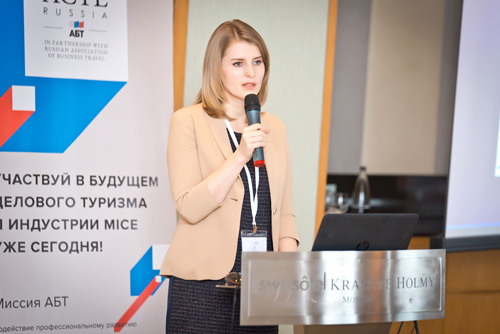
«Our product supports complex organizational structures that are often present in holdings, for example. TripGate also offers user data personalization — the data is kept in the system, so there is no need to fill it in for every booking», Ms Kovshova said. «Besides, our online tool has the function of checking the lowest rate that is always put in the first place in the list. You can also change system settings in such a way, that travellers will have to give the reason for choosing a more expensive rate. The tool offers an automated process of trip approval: after a booking is made a notice is sent to the email of the manager who approves the business trip».
According to the speaker, the main thing customers expect from an SBT is compliance to their corporate travel policy. And TripGate, as Ms Kovshova assured everyone, has quite flexible frameworks of all the necessary settings. For example, you may even set limits for accommodation in different cities. It will be marked in search results whether a certain hotel meets travel policy or not«.
«All this provides transparency of booking and approval processes. And it means better control of business travel costs», the speaker stressed. «You may all well know that sometimes you can save considerably on your ticket by booking a flight that is just 2 hours earlier. And if you take an average ticket price difference of 3000 roubles, and you have, say, 15 employees who travel every month, it leads to considerable economy of 540 thousand roubles».
Ms Kovshova noted that the traditional booking method still prevailed at present, i.e. booking with the help of assistants or travel managers (90%). Only 10% of companies use online solutions nowadays. «Maybe a universal tool does not exist, because different companies have different needs. But about 70% of bookings may be optimized with a Self Booking Tool» the speaker added.
The demand of the Russian market for an SBT was confirmed by Executive Director of UTS Group Ksenia Rebrova: according to her data, about 15% of agency customers use an online tool, about 60% of these customers make bookings through travel coordinators and about 40% have connected their travelling employees directly to an OBT.
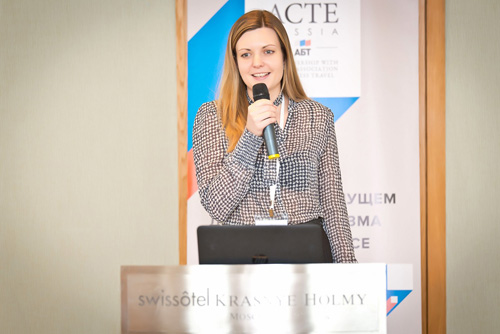
Ms Rebrova devoted her speech to the online tool that was offered by UTS Group and spoke in more detail about special aspects of introduction of this tool through the example of one of their customers. The speaker said it was a large company with several thousand employees, 800 of which travelled actively. The main aims of the customer were: introduction of a system of electronic business trip approval, automatic control of travel policy compliance and automatic data insertion that was necessary for the accounting department. The switch to the online tool should additionally result in the reduction of the travel department staff (that included six employees at the time of the tender) and a cut in service fees. And the main thing, by introducing OBT the company’s executives in its headquarters in Europe wanted to ensure booking transparency.
Project realization required great effort not only on the part of the travel agency, but also on the part of the company itself. Thus, according to Ms Rebrova, the customer had to complete the travel policy (that was rather vague at the moment), finalize the list of employees who could approve business trips, prepare the user list and set their access rights. «Our system offers multiple options of user roles — about 30 parameters», the expert added.
In its turn, UTS Group started with loading databases and report forms, setting access rights and travel policy, building the structure of the company in the system etc. However, one of the most time-consuming tasks for the travel agency was preparation of data interconnections for the accounting department. «The company has a complicated structure of data that should be reflected in reports. There are a total of 13 options, like cost centres, user types and so on», Ms Rebrova explained. «Before the company switched to online, all this information was filled in manually by the employees of the travel department, and each option has from 50 to 400 possible settings! Of course, these were regular mistakes, and documents had to be done over again. We offered this customer such a system of interconnections that allowed excluding unnecessary settings the moment you chose of the first and the next options. Thus, the number of mistakes has been brought to a minimum.

As Kseniya Rebrova said, at the moment 90% of the company staff have been switched to the system, the rest will start using this online tool in the nearest time. The next stage will be connection of UTS24 to the internal customer system that lets control business trip safety (the customer can see where the company employees are at the moment, what their amount is, whether it is necessary to send them any urgent information — for example, through bulk sms-mailing).
Then Ms Rebrova presented a demo version of the online system UTS24 and its particular features, by booking a flight from Moscow to Novosibirsk in the test mode. «Besides, now our system allows downloading a ticket report that is so important for the accounting department at the moment, because legislation has changed this year, and you have to attach tickets to all the documents in order to get VAT», the speaker explained. «You can download tickets of a certain legal body or an employee for a certain period of time, etc. It considerably simplifies the document flow».
Svetlana Morozova, sales director of Zelenski Corporate Travel Solutions spoke about opportunities to adapt ZCTS-Online platform to the needs of a certain corporate buyer. «An OBT is a search engine in the first place. And many companies use it as a search tool», the speaker stressed. «Here you can find any service you need. Our online system includes airline and railway tickets, hotels. There is also a tab called „Individual order“ where all the services that cannot be booked online are listed. For example, VIP service in the airport, a transfer or a conference hall, car rental etc». Besides, the expert noted that OBT does not exclude agents at all — you can always address them: the system offers online communication with a TMC representative.
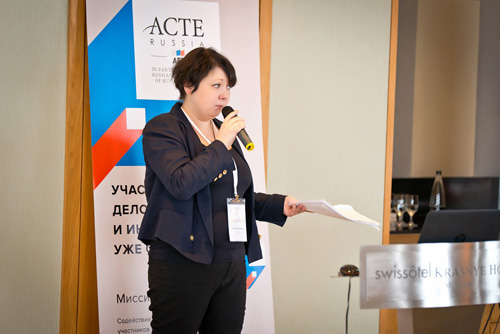
One of the main advantages of the online system is its adaptation to the requirements of the travel policy of the company. Booking variants that meet them are highlighted green, and those that don’t, are red. «What is important, all the variants are included into search results. Because, as we all know, it sometimes happens that there is no economy class for certain destinations at all. So the system offers you business class tickets as well, so that your business trip does not fall through, but they are marked red. But this order will need authorization», Ms Morozova says.
You may include limitations for certain positions or employees, ticket prices or a certain destination — you may make settings depending of the requirements of a certain customer. The speaker said that one of the customers even banned flights with Sukhoi SuperJet. Besides, you may include information on threelateral agreements with airlines into ZCTS Online. And if a traveller books flight with another carrier, this data will also need additional authorization«, Ms Morozova said.
Restrictions of the number of stars, cost and other settings can be introduced for hotels as well. Again, the user will see all the variants. «To my mind, it is important for the corporate buyer to see hotels marked green in the first place, i.e. hotels you have contractual agreements with. In this case the booking scheme will be a little different. You can choose the form of payment — whether we pay for accommodation or you do it yourself at check-in. We also mark recommended and non-recommended hotels».
Ms Morozova said that the section of early check-in and late check-out, which is very important for corporate buyers, was under construction at the moment — the system will mark hotels where it is possible with a special sign. The speaker also added that ZCTS Online had multi-level order authorization. Say, you can set the tool in such a way, that orders are first authorized by a manager in Russia and then by a manager abroad. Employees who authorize business trips receive an email. «Broadly speaking, we can change anything depending on the requirements of the travel policy and working patterns of a certain company», the speaker summarized.
The educational session traditionally ended with a lottery. Travelport offered participants 10 felt i-Pad cases, UTS Group — three certificates for 5 thousand UTS-roubles each that you can use when you connect to the online system of the company. And Swissotel Krasnye Holmy offered a breathtaking prize — a voucher to visit the bar on the top floor of the hotel. After the event anybody who wanted could inspect the hotel.
Natalia Travova





